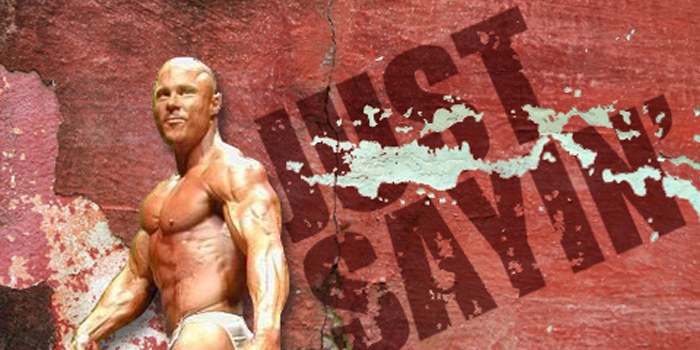
There are a myriad of components or factors that a competitor needs to be successful, and success can be defined in just as many different ways. For some, winning is success, while to others progression towards their goal can be deemed success. No matter your personal definition, in my 30 years of competing and 20 years of training competitors, I have narrowed the endless list of requirements for success down to five main variables.
Passion
It takes years—sometimes decades—to reach the pinnacle of a bodybuilder’s “career.” Not only are there thousands of gut-busting workouts, planned meals, and cardio sessions, but there are also the mundane obligations of tanning, posing practice, shaving, and choreographing posing routines. You can also add to this list many outings lost with friends and family over pizza, drinks, and staying out all night. The life of a successful competitor would seem incredibly boring and unattractive to the layman, but for some reason, we tend to thrive on it. Why? Passion. The love of what we do or pursue.
RECENT: Dos and Don’ts of Dieting While Traveling or on Vacation
Those who do not compete or aren’t a part of the oddly dysfunctional world we live in like to say that competitors are “disciplined.” How many times have you heard a family member or friend tell you how incredibly disciplined you are and how they wish they were? What they fail to understand is that discipline plays no real part in what a competitor does on a daily, monthly, or yearly basis. Why? Because discipline is only involved when someone does something they don’t want to do. To your fat friend who shoves beer nuts (or deez nuts?) in his mouth between swigs of Pabst Blue Ribbon, eating a chicken breast and broccoli for even one meal would take discipline. When passion is involved in an endeavor, discipline ceases to exist.
Knowledge
With so much time, money, and effort involved in becoming a successful competitor, knowledge of training, nutrition, supplementation, and stage presentation (to name only a few) is an absolute necessity. Knowledge is endless in any one of the previously listed areas. Therefore, the process of attaining knowledge can separate you from being a shitty competitor (picture your fat, Pabst-drinking friend in a posing suit), an average competitor, or a great competitor.
Though training has always been quite rudimentary (provide a stimulus that the body is not accustomed to and the muscle will adapt), we have only scratched the surface of understanding nutrition and how it relates to muscle gains and conditioning. If you don’t believe me, hang around for another 20 years, and if you remember me writing this, you will agree with me. I know this because I have been in this sport for over 30 years, and the nutrition information available when I picked up a weight as a teenager was radically different than it is now.

Supplementation might be evolving even faster than the advancements in understanding nutrition. The advances in supplementation in only the last 10 years or so have been revolutionary, and make the supplements of the 80s look grossly antiquated. If you were to compare Joe Weider’s Dynamic Muscle Builder protein to even a mediocre protein of today, there would be no comparison. I presume the next 10 or 20 years will do the same to today’s supplementation.
Knowledge is infinite, and if you plan to continue to progress for decades you will have to accept the fact that there will always be the need to continue to build your knowledge base.
Structure
Without a solid plan, all of the knowledge in the world is useless. Everything needs to be structured and planned, though those plans will sometimes need to change based on the response to the plan. There is a fine line between being structured and giving a plan enough time to be evaluated, and making changes to a plan too soon. Structure also is important for daily routine. With everything that has to be done in a day or a week as a competitor, structure provides the plan to execute everything within the timeframe allotted. Training and meal prep must be planned around jobs, family responsibilities, and other obligations that simply cannot take a backseat. A black-and-white schedule will allow the things that must get done, to get done. This provides confidence in the fact that you will accomplish in that day or week what must be accomplished.
Execution
It might sound simple, but being able to execute a structured plan is vital. The best plans cannot be successful without flawless execution. This falls back on passion to a certain degree, because executing the plan has to always take priority over other things that you might prefer to do but aren’t a part of your structured plan. I love riding my motorcycle probably more than being in the gym, but I cannot be successful if I decide to take a day off from the gym and ride simply because I managed to get a day with the sun shining after two weeks of rain. Passion says I would rather be training and progressing towards my goals, but execution is where I put my head down and forge ahead, not even contemplating whether I would rather be riding on a sunny day than being in the gym.
Unwavering Confidence
This is confidence, not cockiness. Huge difference. Confidence means that you believe that you can achieve what you set out to achieve. I can’t imagine anyone being successful while not believing in themselves or their ability to reach their goals. Talking about how good you think you are or that you will attain your goal is cocky. Confidence is keeping your trap shut and only telling yourself what you are going to do. Typically, those who tell people what they are going to do rarely deliver. Let your actions speak instead of your mouth. At the end of the day, actions tell the truth where your mouth may not always do so.
If you don’t have all of the above factors, don’t despair. If you are missing the knowledge component, you can work with someone who has that knowledge and still be successful. If you are missing any of the other components listed, you can still be a competitor — you just won’t be a very good one. At the same time, because life isn’t fair, you can have all of the above variables and still be a mediocre competitor. I know, because I am one. And that, my friends, is textbook confidence; no cockiness here, at all. Just Sayin'.
Image credit: FSergio © 123rf.com











2 Comments